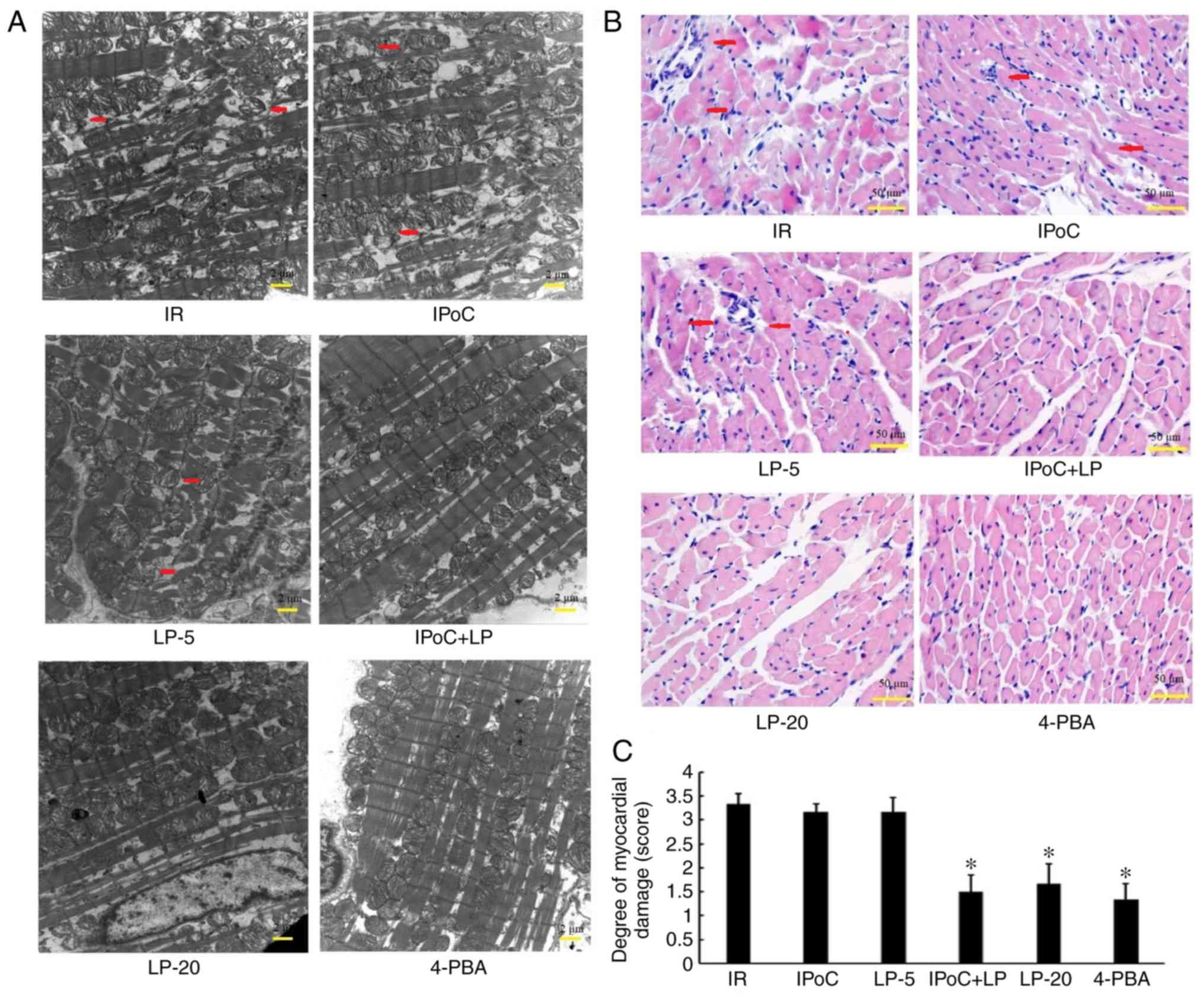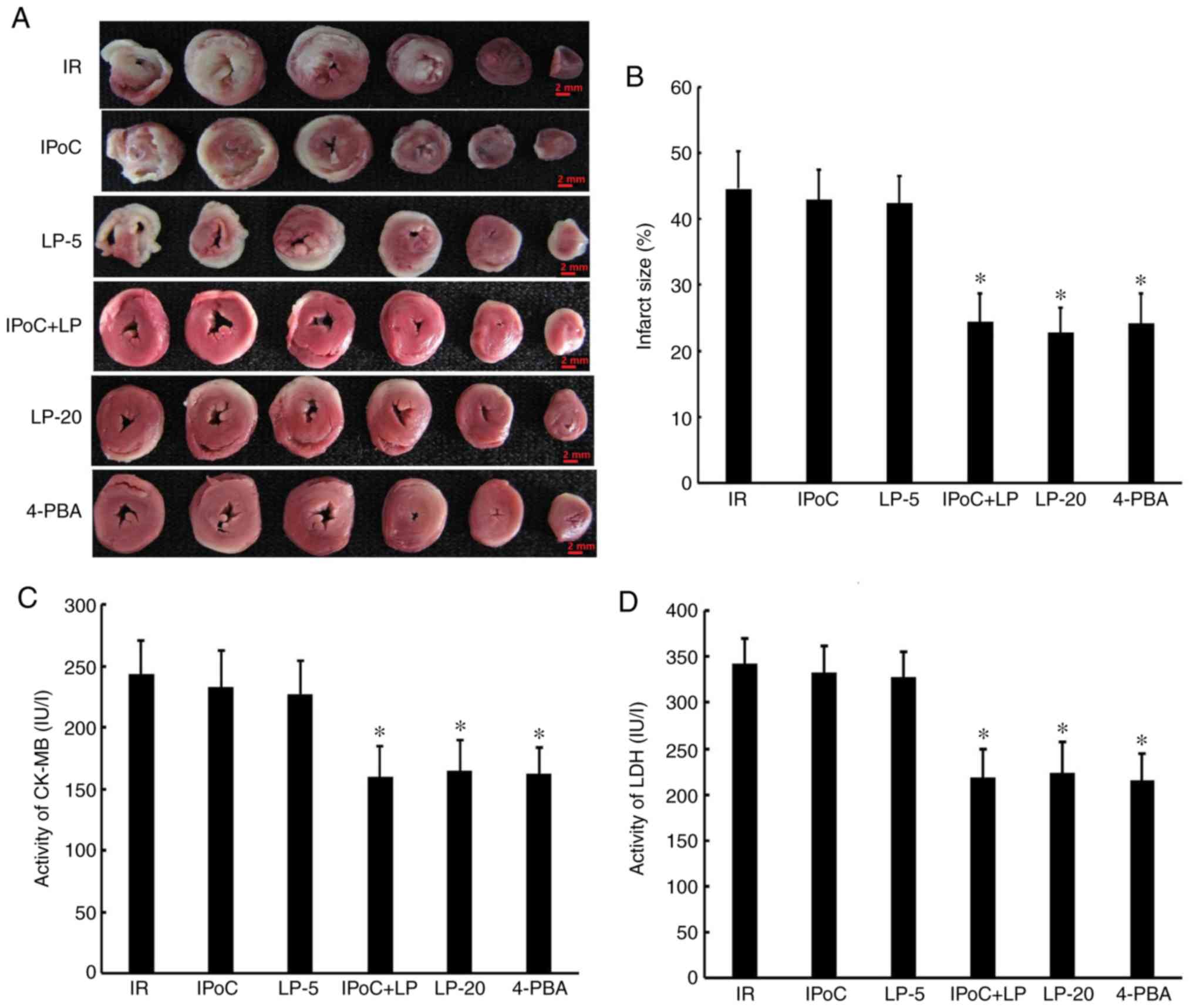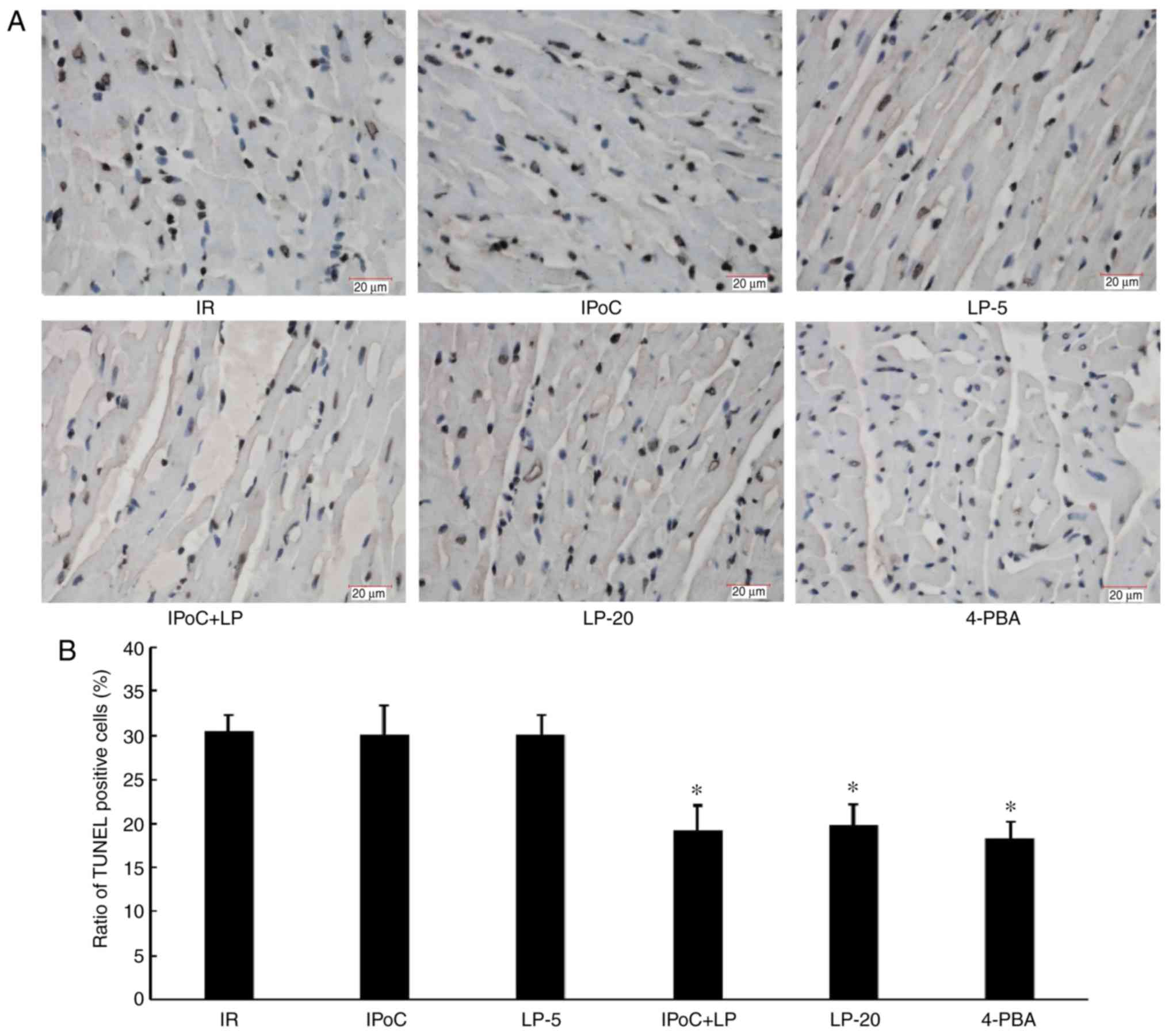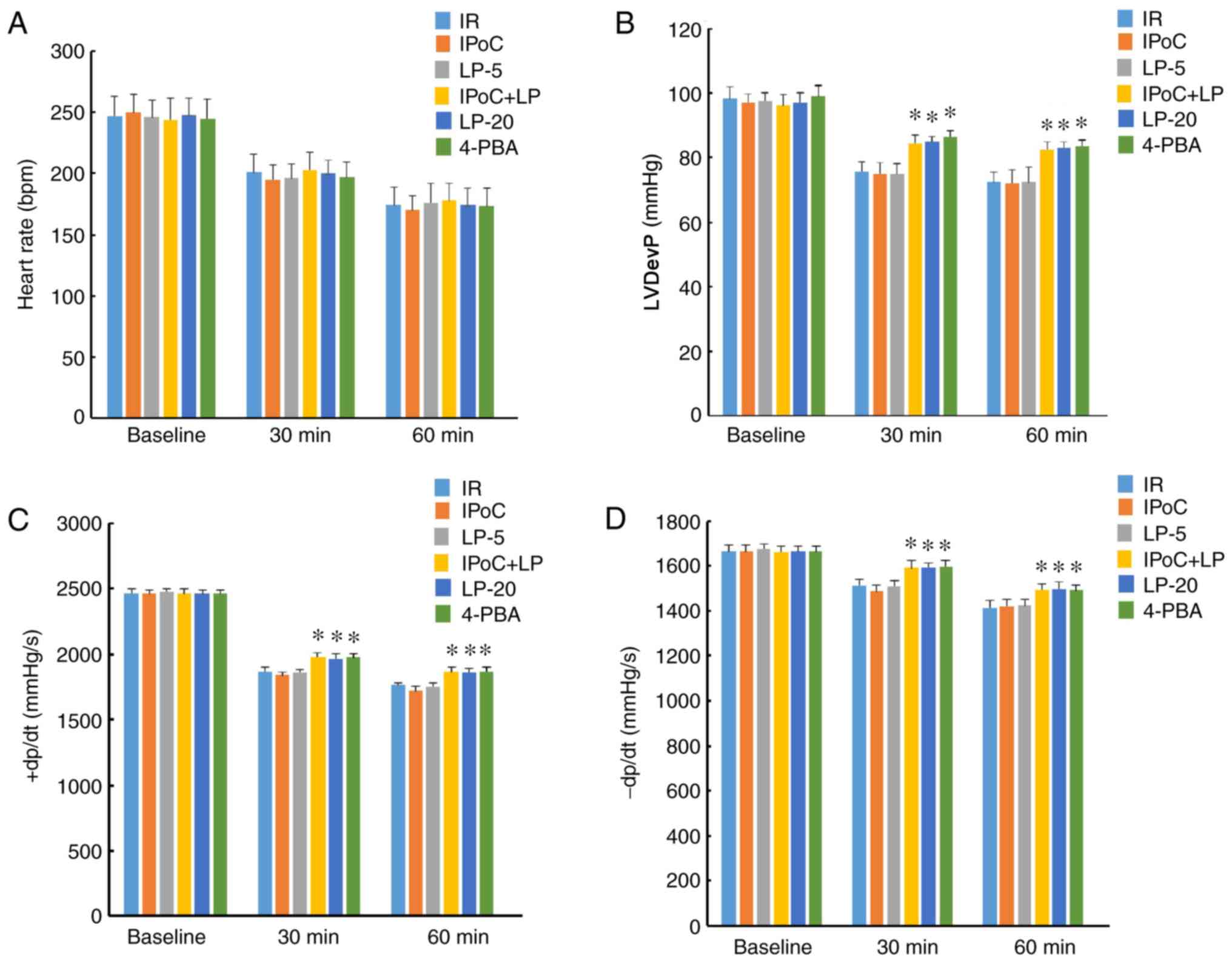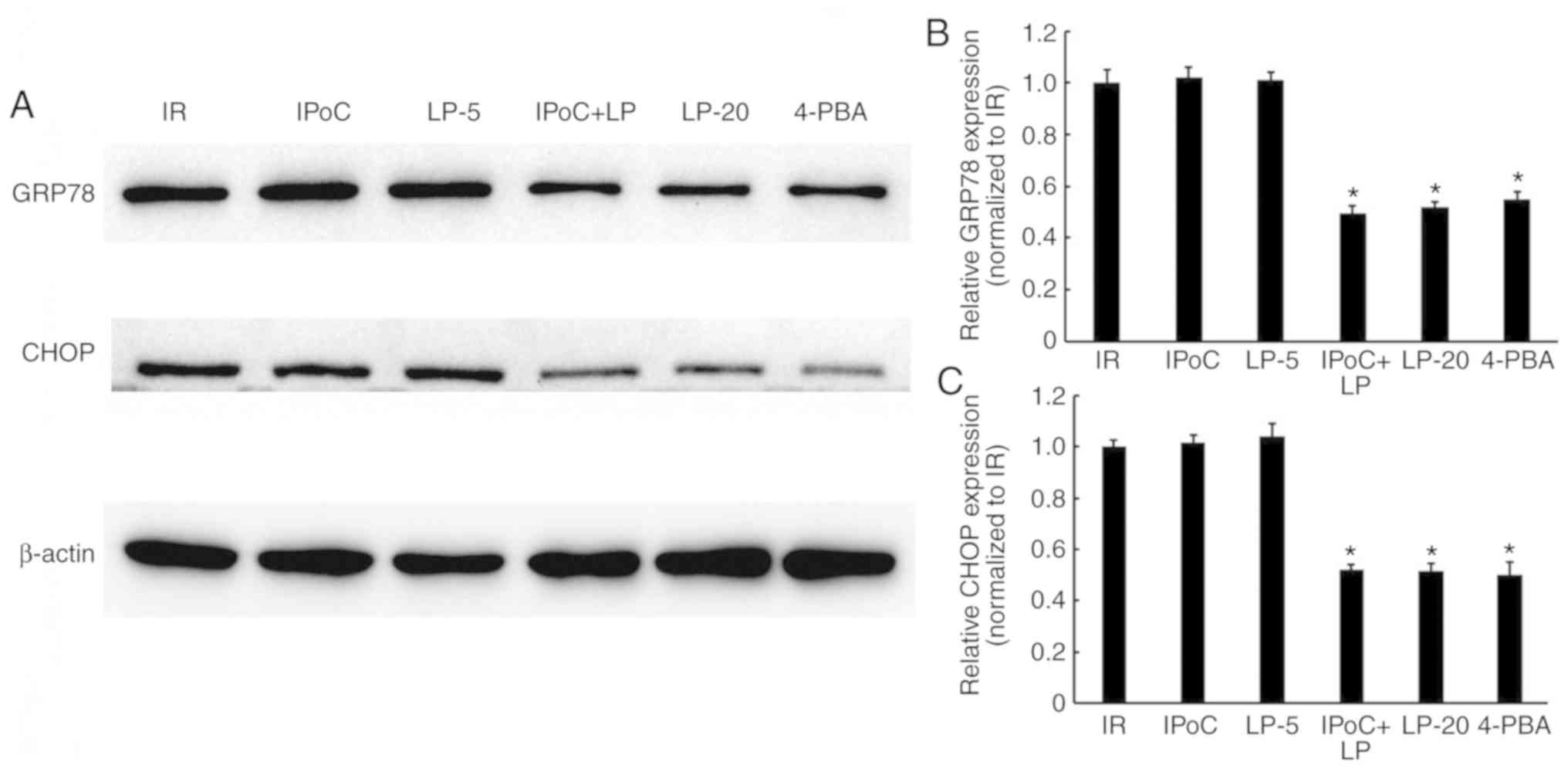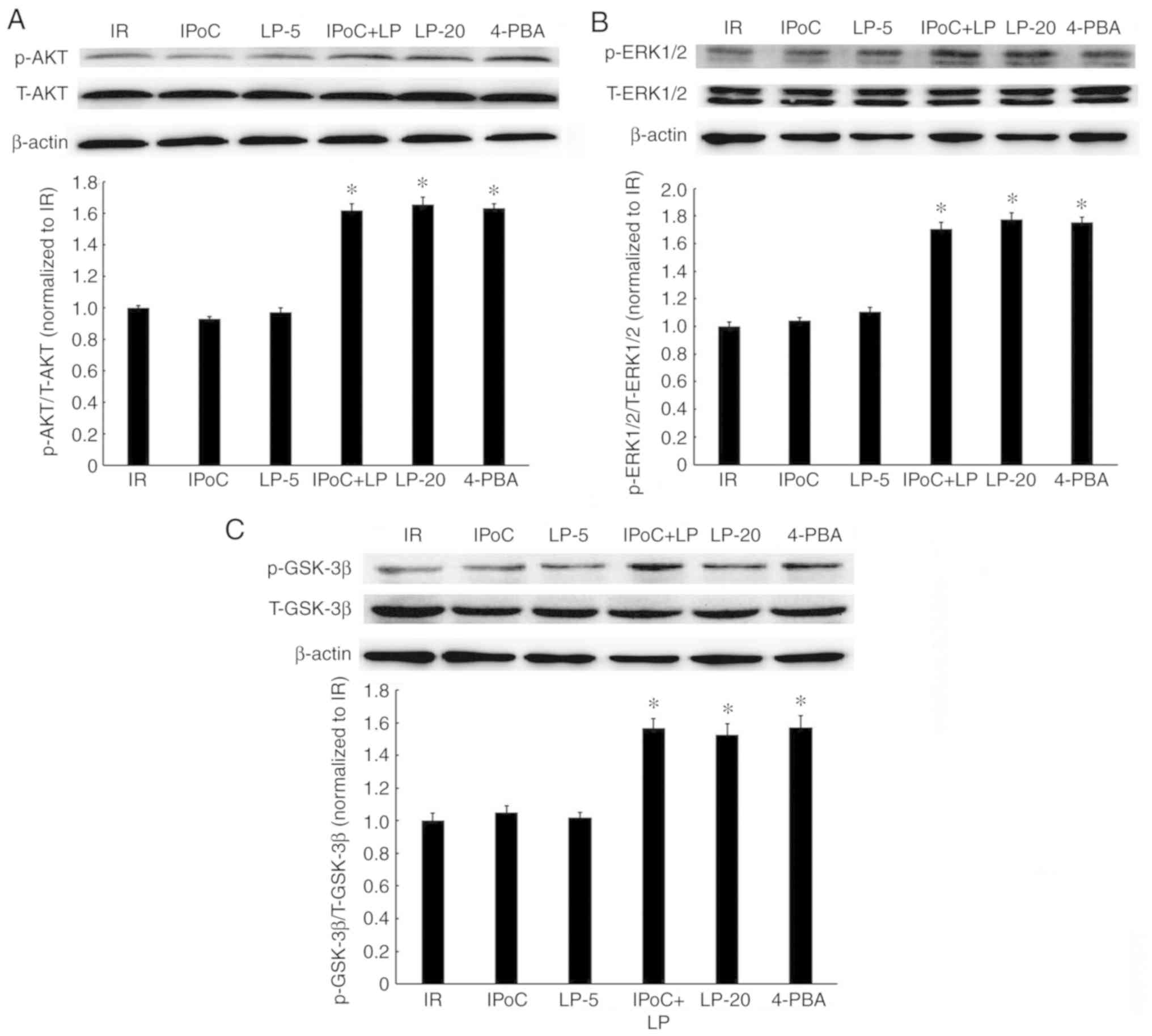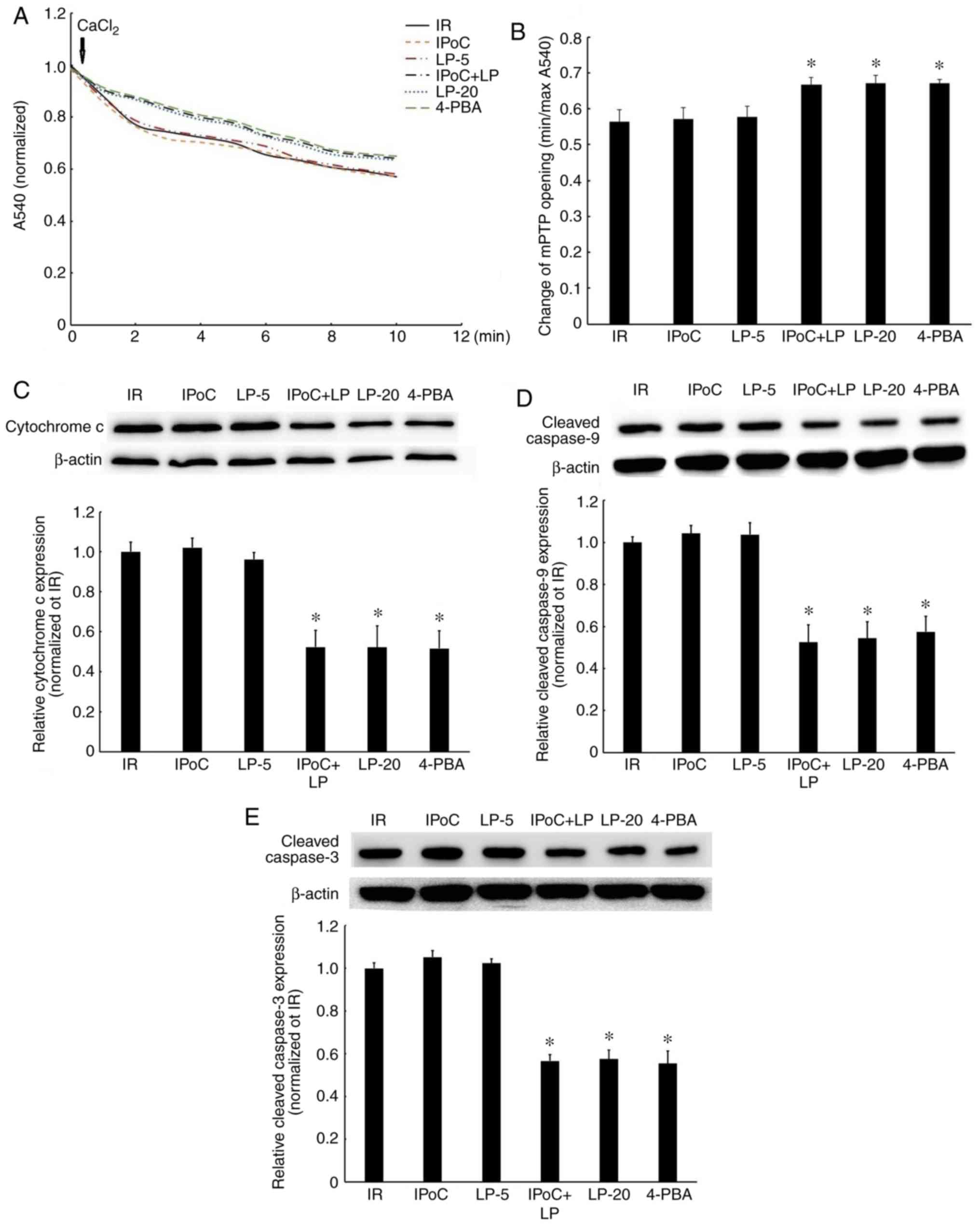|
1
|
Bulluck H, Yellon DM and Hausenloy DJ:
Reducing myocardial infarct size: Challenges and future
opportunities. Heart. 102:341–348. 2016. View Article : Google Scholar :
|
|
2
|
Zhao ZQ, Corvera JS, Halkos ME, Kerendi F,
Wang NP, Guyton RA and Vinten-Johansen J: Inhibition of myocardial
injury by ischemic postconditioning during reperfusion: Comparison
with ischemic preconditioning. Am J Physiol Heart Circ Physiol.
285:H579–H588. 2003. View Article : Google Scholar : PubMed/NCBI
|
|
3
|
Shinohara G, Morita K, Nagahori R, Koh Y,
Kinouchi K, Abe T and Hashimoto K: Ischemic postconditioning
promotes left ventricular functional recovery after cardioplegic
arrest in an in vivo piglet model of global ischemia reperfusion
injury on cardiopulmonary bypass. J Thorac Cardiovasc Surg.
142:926–932. 2011. View Article : Google Scholar : PubMed/NCBI
|
|
4
|
You L, Li L, Xu Q, Ren J and Zhang F:
Postconditioning reduces infarct size and cardiac myocyte apoptosis
via the opioid receptor and JAK-STAT signaling pathway. Mol Biol
Rep. 38:437–443. 2011. View Article : Google Scholar
|
|
5
|
Cao S, Liu Y, Wang H, Mao X, Chen J, Liu
J, Xia Z, Zhang L, Liu X and Yu T: Ischemic postconditioning
influences electron transport chain protein turnover in
Langendorff-perfused rat hearts. Peer J. 4:e17062016. View Article : Google Scholar : PubMed/NCBI
|
|
6
|
Tong G, Aponte AM, Kohr MJ, Steenbergen C,
Murphy E and Sun J: Postconditioning leads to an increase in
protein S-nitrosylation. Am J Physiol Heart Circ Physiol.
306:H825–H832. 2014. View Article : Google Scholar : PubMed/NCBI
|
|
7
|
Araszkiewicz A, Grygier M, Pyda M,
Rajewska J, Michalak M, Lesiak M and Grajek S: Postconditioning
reduces enzymatic infarct size and improves microvascular
reperfusion in patients with ST-segment elevation myocardial
infarction. Cardiology. 129:250–257. 2014. View Article : Google Scholar : PubMed/NCBI
|
|
8
|
Araszkiewicz A, Grygier M, Pyda M,
Rajewska J, Lesiak M and Grajek S: Postconditioning attenuates
early ventricular arrhythmias in patients with high-risk ST-segment
elevation myocardial infarction. J Cardiol. 65:459–465. 2015.
View Article : Google Scholar : PubMed/NCBI
|
|
9
|
Ferdinandy P, Hausenloy DJ, Heusch G,
Baxter GF and Schulz R: Interaction of risk factors, comorbidities,
and comedications with ischemia/reperfusion injury and
cardioprotection by preconditioning, postconditioning, and remote
conditioning. Pharmacol Rev. 66:1142–1174. 2014. View Article : Google Scholar : PubMed/NCBI
|
|
10
|
D'Annunzio V, Donato M, Buchholz B, Pérez
V, Miksztowicz V, Berg G and Gelpi RJ: High cholesterol diet
effects on ischemia-reperfusion injury of the heart. Can J Physiol
Pharmacol. 90:1185–1196. 2012. View Article : Google Scholar : PubMed/NCBI
|
|
11
|
Wu N, Zhang X, Jia P and Jia D:
Hypercholesterolemia aggravates myocardial ischemia reperfusion
injury via activating endoplasmic reticulum stress-mediated
apoptosis. Exp Mol Pathol. 99:449–454. 2015. View Article : Google Scholar : PubMed/NCBI
|
|
12
|
Wu N, Zhang X, Guan Y, Shu W, Jia P and
Jia D: Hypercholesterolemia abrogates the cardioprotection of
ischemic postconditioning in isolated rat heart: Roles of glycogen
synthase kinase-3β and the mitochondrial permeability transition
pore. Cell Biochem Biophys. 69:123–130. 2014. View Article : Google Scholar
|
|
13
|
Wu N, Zhang X, Jia P and Jia D:
Hypercholesterolemia abrogates the protective effect of ischemic
postconditioning by induction of apoptosis and impairment of
activation of reperfusion injury salvage kinase pathway. Biochem
Biophys Res Commun. 458:148–153. 2015. View Article : Google Scholar : PubMed/NCBI
|
|
14
|
Andreadou I, Iliodromitis EK, Lazou A,
Görbe A, Giricz Z, Schulz R and Ferdinandy P: Effect of
hypercholesterolaemia on myocardial function, ischaemia-reperfusion
injury and cardio-protection by preconditioning, postconditioning
and remote conditioning. Br J Pharmacol. 174:1555–1569. 2017.
View Article : Google Scholar : PubMed/NCBI
|
|
15
|
Andreadou I, Farmakis D, Prokovas E,
Sigala F, Zoga A, Spyridaki K, Papalois A, Papapetropoulos A,
Anastasiou-Nana M, Kremastinos DT and Iliodromitis EK: Short-term
statin administration in hypercholesterolaemic rabbits resistant to
postconditioning: Effects on infarct size, endothelial nitric oxide
synthase, and nitro-oxidative stress. Cardiovasc Res. 94:501–509.
2012. View Article : Google Scholar : PubMed/NCBI
|
|
16
|
Wu N, Li W, Shu W, Lv Y and Jia D:
Inhibition of Rho-kinase by fasudil restores the cardioprotection
of ischemic postcondi-tioninng in hypercholesterolemic rat heart.
Mol Med Rep. 10:2517–2524. 2014. View Article : Google Scholar : PubMed/NCBI
|
|
17
|
Wu N, Li WN, Shu WQ, Lv Y and Jia DL:
Blocking the mitochondrial permeability transition pore with
cyclosporine-A can restore cardioprotection of ischemic
postconditioning in hypercholesterolemic rat heart. Eur Rev Med
Pharmacol Sci. 19:446–454. 2015.PubMed/NCBI
|
|
18
|
Riccioni G, Mancini B, Di Ilio E,
Bucciarelli T and D'Orazio N: Protective effect of lycopene in
cardiovascular disease. Eur Rev Med Pharmacol Sci. 12:183–190.
2008.PubMed/NCBI
|
|
19
|
Xu J, Hu H, Chen B, Yue R, Zhou Z, Liu Y,
Zhang S, Xu L, Wang H and Yu Z: Lycopene protects against
hypoxia/reoxygenation injury by alleviating ER stress induced
apoptosis in neonatal mouse cardiomyocytes. PLoS One.
10:e01364432015. View Article : Google Scholar : PubMed/NCBI
|
|
20
|
Yue R, Hu H, Yiu KH, Luo T, Zhou Z, Xu L,
Zhang S, Li K and Yu Z: Lycopene protects against
hypoxia/reoxygenation-induced apoptosis by preventing mitochondrial
dysfunction in primary neonatal mouse cardiomyocytes. PLoS One.
7:e507782012. View Article : Google Scholar : PubMed/NCBI
|
|
21
|
Kastenmayer RJ, Moore RM, Bright AL,
Torres-Cruz R and Elkins WR: Select agent and toxin regulations:
Beyond the eighth edition of the guide for the care and use of
laboratory animals. J Am Assoc Lab Anim Sci. 51:333–338.
2012.PubMed/NCBI
|
|
22
|
Jia P, Liu C, Wu N, Jia D and Sun Y:
Agomelatine protects against myocardial ischemia reperfusion injury
by inhibiting mitochondrial permeability transition pore opening.
Am J Transl Res. 10:1310–1323. 2018.PubMed/NCBI
|
|
23
|
Bayramoglu G, Bayramoglu A, Altuner Y,
Uyanoglu M and Colak S: The effects of lycopene on hepatic
ischemia/reperfusion injury in rats. Cytotechnology. 67:487–491.
2015. View Article : Google Scholar :
|
|
24
|
Göncü T, Oğuz E, Sezen H, Koçarslan S,
Oğuz H, Akal A, Adıbelli FM, Çakmak S and Aksoy N:
Anti-inflammatory effect of lycopene on endotoxin-induced uveitis
in rats. Arq Bras Oftalmol. 79:357–362. 2016. View Article : Google Scholar
|
|
25
|
Güzel M, Sönmez MF, Baştuğ O, Aras NF,
Öztürk AB, Küçükaydın M and Turan C: Effectiveness of lycopene on
experimental testicular torsion. J Pediatr Surg. 51:1187–1191.
2016. View Article : Google Scholar
|
|
26
|
Grall S, Prunier-Mirebeau D, Tamareille S,
Mateus V, Lamon D, Furber A and Prunier F: Endoplasmic reticulum
stress pathway involvement in local and remote myocardial ischemic
conditioning. Shock. 39:433–439. 2013. View Article : Google Scholar : PubMed/NCBI
|
|
27
|
Jia D: The protective effect of
mitochondrial ATP-sensitive K+ channel opener, nicorandil, combined
with Na+/Ca2+ exchange blocker KB-R7943 on myocardial
ischemia-reperfusion injury in rat. Cell Biochem Biophys.
60:219–224. 2011. View Article : Google Scholar
|
|
28
|
Zingarelli B, Salzman AL and Szabó C:
Genetic disruption of poly (ADP-ribose) synthetase inhibits the
expression of P-selectin and intercellular adhesion molecule-1 in
myocardial ischemia/reperfusion injury. Circ Res. 83:85–94. 1998.
View Article : Google Scholar : PubMed/NCBI
|
|
29
|
Wu N, Zhang X and Jia D: High-dose fasudil
preconditioning and postconditioning attenuate myocardial
ischemia-reperfusion injury in hypercholesterolemic rats. Mol Med
Rep. 9:560–566. 2014. View Article : Google Scholar
|
|
30
|
Hausenloy DJ, Tsang A and Yellon DM: The
reperfusion injury salvage kinase pathway: A common target for both
ischemic preconditioning and postconditioning. Trends Cardiovasc
Med. 15:69–75. 2005. View Article : Google Scholar : PubMed/NCBI
|
|
31
|
Zhu H, Ding Y, Xu X, Li M, Fang Y, Gao B,
Mao H, Tong G, Zhou L and Huang J: Prostaglandin E1 protects
coronary microvascular function via the glycogen synthase kinase
3β-mitochondrial permeability transition pore pathway in rat hearts
subjected to sodium laurate-induced coronary microembolization. Am
J Transl Res. 9:2520–2534. 2017.
|
|
32
|
Zhao JL, Yang YJ, You SJ, Cui CJ and Gao
RL: Different effects of postconditioning on myocardial no-reflow
in the normal and hypercholesterolemic mini-swines. Microvasc Res.
73:137–142. 2007. View Article : Google Scholar
|
|
33
|
Iliodromitis EK, Zoga A, Vrettou A,
Andreadou I, Paraskevaidis IA, Kaklamanis L and Kremastinos DT: The
effectiveness of postconditioning and preconditioning on infarct
size in hypercho-lesterolemic and normal anesthetized rabbits.
Atherosclerosis. 188:356–362. 2006. View Article : Google Scholar
|
|
34
|
Donato M, D'Annunzio V, Berg G, Gonzalez
G, Schreier L, Morales C, Wikinski RL and Gelpi RJ: Ischemic
postconditioning reduces infarct size by activation of A1 receptors
and K+(ATP) channels in both normal and hypercholesterolemic
rabbits. J Cardiovasc Pharmacol. 49:287–292. 2007. View Article : Google Scholar : PubMed/NCBI
|
|
35
|
Iliodromitis EK, Andreadou I, Prokovas E,
Zoga A, Farmakis D, Fotopoulou T, Ioannidis K, Paraskevaidis IA and
Kremastinos DT: Simvastatin in contrast to postconditioning reduces
infarct size in hyperlipidemic rabbits: Possible role of
oxidative/nitrosative stress attenuation. Basic Res Cardiol.
105:193–203. 2010. View Article : Google Scholar : PubMed/NCBI
|
|
36
|
Zeng YC, Hu MY, Qu SL and Zhou GY: Effects
of lycopene on blood lipid and red blood cell of rat with
hypercholesterolemia. Zhonghua Yu Fang Yi Xue Za Zhi. 43:1064–1068.
2009.In Chinese.
|
|
37
|
Paolini M, Abdel-Rahman SZ, Sapone A,
Pedulli GF, Perocco P, Cantelli-Forti G and Legator MS:
Beta-carotene: A cancer chemo-preventive agent or a co-carcinogen.
Mutat Res. 543:195–200. 2003. View Article : Google Scholar : PubMed/NCBI
|
|
38
|
Yeh SL and Hu ML: Induction of oxidative
DNA damage in human foreskin fibroblast Hs68 cells by oxidized
beta-Carotene and lycopene. Free Radic Res. 35:203–213. 2001.
View Article : Google Scholar : PubMed/NCBI
|
|
39
|
Rasheva VI and Domingos PM: Cellular
responses to endoplasmic reticulum stress and apoptosis. Apoptosis.
14:996–1007. 2009. View Article : Google Scholar : PubMed/NCBI
|
|
40
|
Szegezdi E, Logue SE, Gorman AM and Samali
A: Mediators of endoplasmic reticulum stress-induced apoptosis.
EMBO Rep. 7:880–885. 2006. View Article : Google Scholar : PubMed/NCBI
|
|
41
|
Sivaraman V, Mudalagiri NR, Di Salvo C,
Kolvekar S, Hayward M, Yap J, Keogh B, Hausenloy DJ and Yellon DM:
Postconditioning protects human atrial muscle through the
activation of the RISK pathway. Basic Res Cardiol. 102:453–459.
2007. View Article : Google Scholar : PubMed/NCBI
|
|
42
|
Gomez L, Paillard M, Thibault H, Derumeaux
G and Ovize M: Inhibition of GSK3beta by postconditioning is
required to prevent opening of the mitochondrial permeability
transition pore during reperfusion. Circulation. 117:2761–2768.
2008. View Article : Google Scholar : PubMed/NCBI
|
|
43
|
Miki T, Miura T, Hotta H, Tanno M, Yano T,
Sato T, Terashima Y, Takada A, Ishikawa S and Shimamoto K:
Endoplasmic reticulum stress in diabetic hearts abolishes
erythropoietin-induced myocardial protection by impairment of
phosphoglycogen synthase kinase-3beta-mediated suppression of
mitochondrial permeability transition. Diabetes. 58:2863–2872.
2009. View Article : Google Scholar : PubMed/NCBI
|
|
44
|
Bell RM, Mocanu MM and Yellon DM:
Retrograde heart perfusion: The Langendorff technique of isolated
heart perfusion. J Mol Cell Cardiol. 50:940–950. 2011. View Article : Google Scholar : PubMed/NCBI
|
|
45
|
Hu L, Cheng XW, Song H, Inoue A, Jiang H,
Li X, Shi GP, Kozawa E, Okumura K and Kuzuya M: Cathepsin K
activity controls injury-related vascular repair in mice.
Hypertension. 63:607–615. 2014. View Article : Google Scholar :
|
|
46
|
Cheng Wu H, Hu XW, Takeshita L, Hu K, Du
C, Li Q, Zhu X, Huang E, Yisireyili ZM, et al: Cathepsin S activity
controls injury-related vascular repair in mice via the
TLR2-mediated p38MAPK and PI3K-Akt/p-HDAC6 signaling pathway.
Arterioscler Thromb Vasc Biol. 36:1549–1557. 2016. View Article : Google Scholar : PubMed/NCBI
|
|
47
|
Cheng XW, Shi GP, Kuzuya M, Sasaki T,
Okumura K and Murohara T: Role for cysteine protease cathepsins in
heart disease: Focus on biology and mechanisms with clinical
implication. Circulation. 125:1551–1562. 2012. View Article : Google Scholar : PubMed/NCBI
|
|
48
|
Ogasawara S, Cheng XW, Inoue A, Hu L, Piao
L, Yu C, Goto H, Xu W, Zhao G, Lei Y, et al: Cathepsin K activity
controls cardiotoxin-induced skeletal muscle repair in mice. J
Cachexia Sarcopenia Muscle. 9:160–175. 2018. View Article : Google Scholar
|
|
49
|
Cadenas S: ROS and redox signaling in
myocardial ischemia-reperfusion injury and cardioprotection. Free
Radic Biol Med. 117:76–89. 2018. View Article : Google Scholar : PubMed/NCBI
|
|
50
|
Andrienko TN, Pasdois P, Pereira GC, Ovens
MJ and Halestrap AP: The role of succinate and ROS in reperfusion
injury-A critical appraisal. J Mol Cell Cardiol. 110:1–14. 2017.
View Article : Google Scholar : PubMed/NCBI
|















